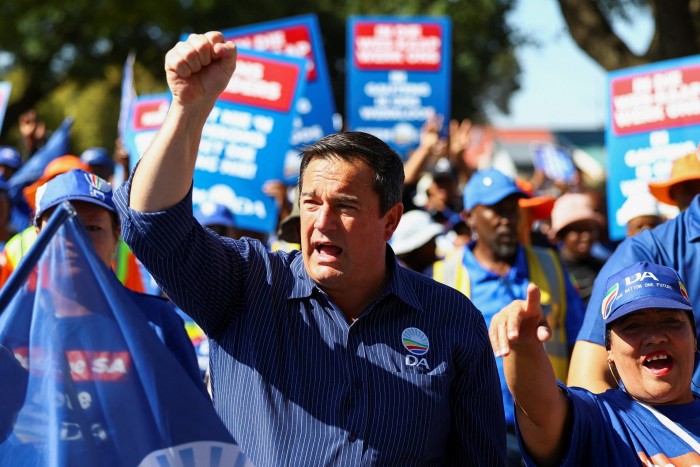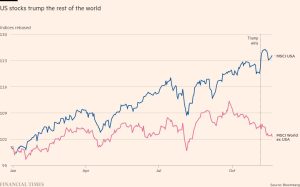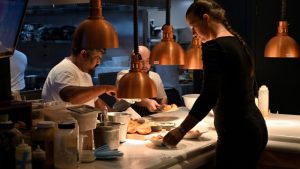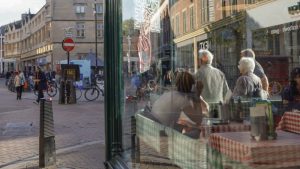Russian tensions expose faultlines in South Africa’s unity government

South Africa’s grand coalition government, which has surprised sceptics by holding together, is battling to contain a foreign policy stand-off between the two largest parties.
In the past week, clashes over the three most contentious foreign policy issues — Russia, China and Israel — have exposed deep ideological rifts between the African National Congress and the Democratic Alliance and deepened fears that the coalition of 10 parties may not survive a full five-year term.
Speaking at a summit of the Brics countries in Kazan, President Cyril Ramaphosa declared that Russia’s Vladimir Putin was a “valued ally” and “valued friend” of South Africa.
This provoked an angry response from John Steenhuisen, the DA’s leader and the minister of agriculture in Ramaphosa’s cabinet, who said that Putin may be Ramaphosa’s friend but his “authoritarian regime, that is currently violating international law by waging an imperialist war of aggression against a sovereign state”, is no friend of South Africa.
Vincent Magwenya, Ramaphosa’s spokesman, said Steenhuisen was trying “to micromanage the president”, whose loyalty to Moscow dates back to the apartheid era when Soviet Russia provided training and arms to the ANC.
This inconsistent foreign policy — the government refused to condemn Russia’s 2022 invasion of the Ukraine on the basis that it was “non-aligned”, yet it lodged a case of genocide against Israel in the International Court of Justice this year over the invasion of Gaza — has opened the country up to claims of double standards.
“South Africa has never let even-handedness get in the way of its foreign policy, nor human rights in its dealings with all manner of authoritarian regimes,” Greg Mills, an analyst at the Brenthurst Foundation think-tank told the Financial Times.
Mills said that at the Brics forum this week, Ramaphosa singled out the conflict in Gaza but made no mention of the Ukraine, for instance.
“South Africa has not played to its democratic strengths or to the spirit of our own negotiated transition, but rather to a revolutionary mythology,” he said.
Emma Powell, the DA’s spokesperson on international relations, said that “if Ramaphosa wants to be friends with an imperialist warmonger like Putin, that is on him”.
“But the point is, the cabinet needs to find consensus on these issues. Where there are ideological faultlines in the unity government, this needs to be mediated and a form of reconciliation found so we can be consistent in our policy of non-alignment,” she said.

While Powell said it would be “foolish” to pull out of the government based on this foreign policy disagreement, she said Ramaphosa did not appreciate that his party had lost its outright majority. The ANC was compelled to form a coalition after its share of the vote fell to just 40.2 per cent in the May election.
“Ramaphosa doesn’t have autonomy any longer to make policy pronouncements on behalf of the government without getting consensus from his partners,” she said.
This spat compounded a disagreement days before when the government ordered Taiwan to move its de facto embassy from Pretoria, where all the embassies are based, to Johannesburg.
According to the DA, South Africa’s second largest party, the move was made in deference to China, another long-standing ally of the ANC. The government’s department of international affairs argued that it was “standard diplomatic practice” to house trade offices in the country’s economic hub, which is Johannesburg.
Adam Habib, the director of Soas University of London, said the foreign policy disputes would deepen tensions between the parties, even if they did not break up the coalition.
“Everyone knew there were serious differences between the parties coming into this government,” he told the FT. “But the problem is, there are significant elements in the ANC who are intent on splitting apart this coalition. And if this group becomes ascendant, they will use these ideological differences as an excuse for breaking it apart.”
An argument over Israel resurfaced this week, too, as parliament was told that international relations minister Ronald Lamola would move ahead with the plan to sever all diplomatic ties with Israel “before the end of this year”.
A year ago, parliament adopted a resolution to cut diplomatic relations, including permanently closing the embassy in Tel Aviv. The DA opposed the resolution.
Asked about his “reluctance” to close the embassy this month, Ramaphosa told Parliament that “we are also considering the various broad issues around it. Our support for the cause of the Palestinians is irrevocable.”
Israel has been a flashpoint between the parties before, with the DA questioning the ANC government’s decision to lodge the genocide case with the international court of justice, arguing that this compromised its role as a neutral mediator.
Powell said that while the DA opposed the ANC’s desire to cut off diplomatic ties with Israel, the two parties were not that far apart on the wider issue.
“The DA has called for a ceasefire in Gaza, the restoration of the 1967 borders and condemned illegal Israeli settlements on the West Bank. Where we differ is we see Hamas as a terrorist organisation and believe in Israel’s right to defend itself,” she said.
She said the downgraded Tel Aviv embassy would probably remain open, if only for practical reasons of needing to service the region. “These are just dog whistles to appease a certain part of the ANC’s constituency,” she said.
Habib believes that keeping the unity government together requires a deft political touch.
“It is entirely possible to craft a collective foreign policy for this government that is nuanced, and doesn’t make this a zero-sum outcome on all these issues,” he said.
#Russian #tensions #expose #faultlines #South #Africas #unity #government




